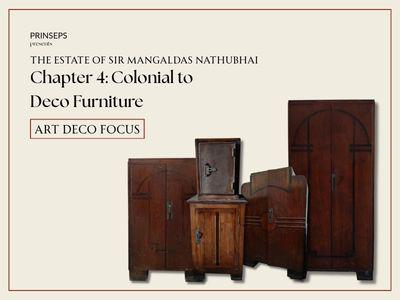The Estate of Sir Mangaldas Nathubhai: Colonial to Art Deco Furniture
The next chapter in the multi-part auction series of The Estate of Sir Mangaldas Nathubhai turns to the interiors of 1930s Bombay — a city at the height of its Art Deco transformation. As cinemas, apartment blocks, and seafront promenades rose along Marine Drive and Colaba, this new design language entered Bombay’s homes. Within the Mangaldas family residences at Girgaum, Malabar Hill, and later Commonwealth, these cabinets, wardrobes, and vanities reflected the same spirit of progress, precision, and elegance that defined the era.
Read More













